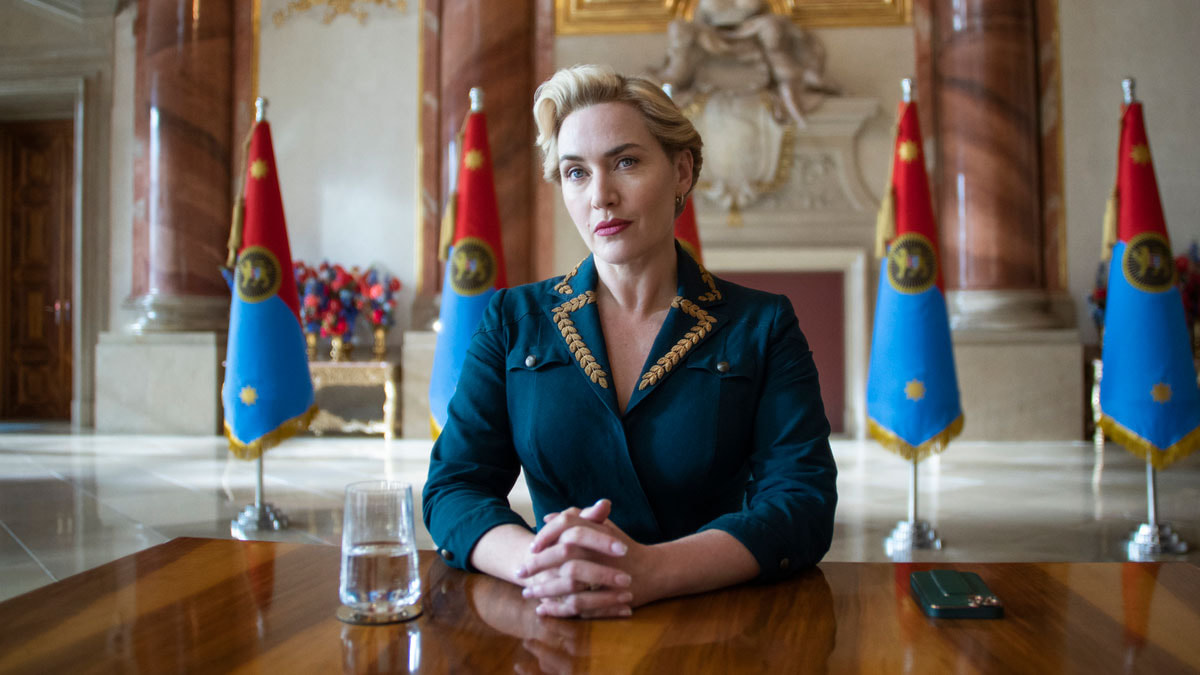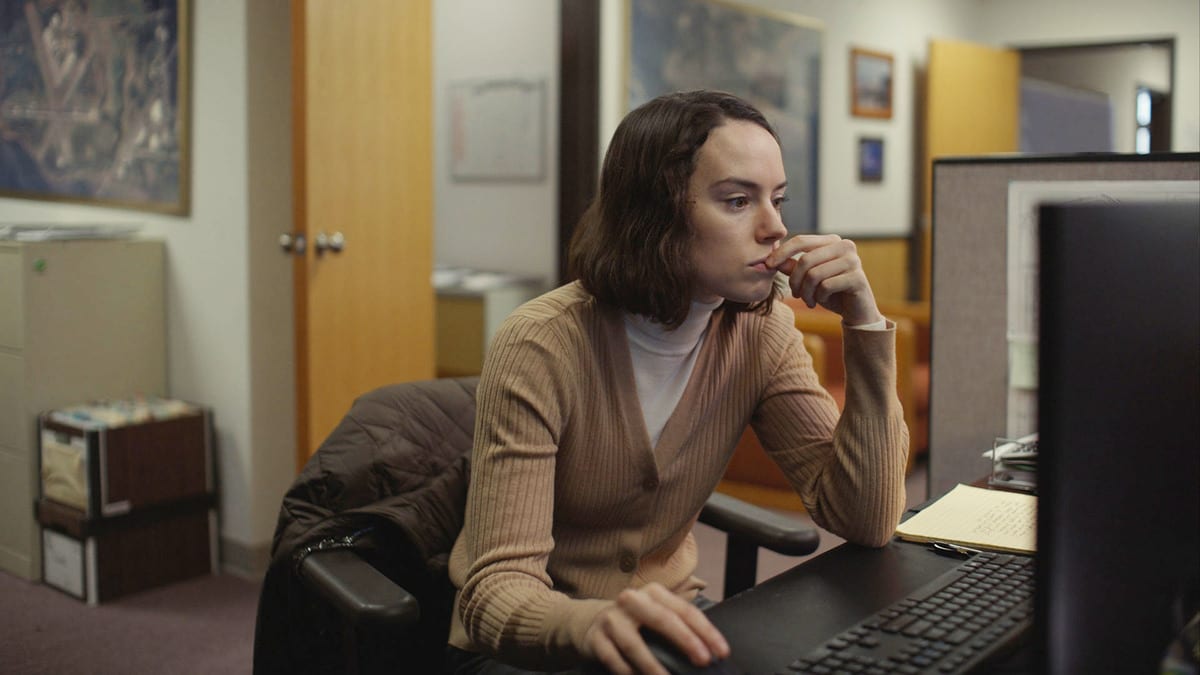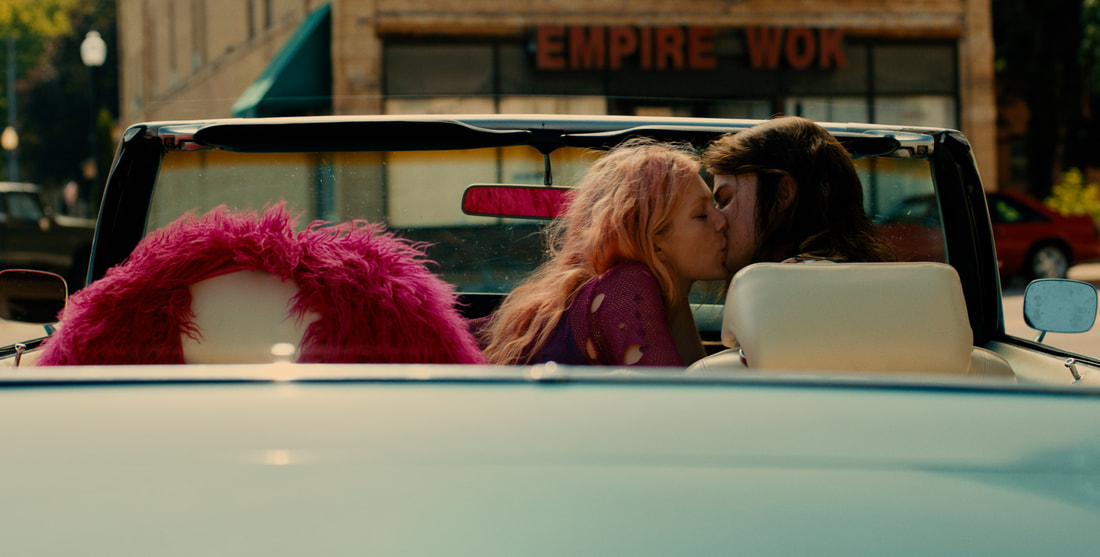|
By Nadia Dalimonte Kate Winslet in HBO's The Regime The magic formula of pairing Kate Winslet with an HBO series has been tried and true. 2011’s period melodrama Mildred Pierce from visionary director Todd Haynes won 5 Primetime Emmys, including Lead Actress in a Miniseries for Winslet’s starring titular role. A decade later, 2021’s detective mystery Mare of Easttown from creator Brad Ingelsby won 4 Primetime Emmys, among them a Lead Actress win for Winslet’s lovable Mare. Her performance struck an emotional chord and infused you with a sense of wonder as to what became of the small-town detective. The graceful end to her chapter beautifully stuck the landing. While we may never get another season, understandably so given it’s a limited series (a distinction that’s been played around with as of late), this void left behind can be filled by yet another electric pairing.
HBO’s six-part limited series The Regime, from the producers of Succession, pulls compelling satire from a thinly veiled authoritarian regime. Winslet plays Chancellor Elena Vernham, a delusional dictator of a fictitious country in “Central Europe” whose power begins to unravel. Elena’s synthetic-looking palace, complete with leopard print accents and an underground disco, has become a bubble of her own creation. The clinical palace walls have housed everything from her hypochondria and paranoia to bizarre social media livestreams and meetings broadcasted live from her bathtub. After some time in this absurdist loop, Elena finds a fix for her boredom: Herbert Zubak (Matthias Schoenaerts), a disgraced corporal and assassin who becomes her confidant, and maybe more. With Zubak by her side, the Chancellor finds new ways of exercising her power within the palace and carefully maintaining her image to the country’s people, who she collectively refers to as “my loves.” But her obliviousness to what real people need, and the human rights issues they face daily, is alarmingly dire. Zubak’s growing impact on the Chancellor walks a fascinating tightrope between appeasing to an out-of-touch figure of authority and undermining it for the good of the country. Her grounds for decision-making operate on fear, and a deeply embedded trauma that the series dodges. Elena is a character who always thrives from power, which allows for Zubak’s volatile commands on her behalf to be tuned up at maximum volume. Their dynamic moves to the rhythm of an old rollercoaster where every wobble and creak can be heard. Watching them both navigate a power struggle within their own relationship is dynamite. As executive producer and lead performer, Winslet excels at capturing the darkly comic tone that runs through the veins of The Regime. The world is not ready for how much fun she has bringing Elena Vernham to absurdist life. This character gives one of the most accomplished and versatile actors, decades into her career, a playground to flex brand new muscles. Following up the protective hardshell of a tragically real Mare Sheehan, with a woman so far removed from any semblance of real life, is a thrilling testament to Winslet’s talent. Her sense of humor is also on full display; Elena is far and away the funniest role and performance of her career. From punchy one-liners and singing deliberately out-of-tune, to an entertaining display of physical comedy. The supporting cast rounding out The Regime include Matthias Schoenaerts, brilliantly cast in the role of Zubak. Not only does he balance the intensity of this character’s physicality and stamina, but also the emotional needs that anchor his decision-making. Zubak is hardwired to equate love with pain, which influences his relationship to the Chancellor. While the writing does not flesh him out enough as Elena, leaving more to be desired, Schoenaerts brings a compelling presence to the screen and shares both frightening and amusing chemistry with Winslet. Zubak takes up most of the space around Elena, as her husband (an endearing Guillaume Gallienne) watches on. Other characters operate much like Elena’s husband, mere observers to the madness. Andrea Riseborough, while great as usual, unfortunately does not get as much material to work with as hoped for. The same can be said for Martha Plimpton and Hugh Grant, electric in their roles but missing the opportunity to pack a bigger punch. The Chancellor is the primary source of entertainment in The Regime, and the writers know it. The screenplay smartly focuses on Elena’s character development with an understanding of her performative nature and the sublime talent that Winslet brings to the table. The character’s grip on power is tumbling down in real time, and yet she puts on a bubbly face without a care in the world. Her surrounding government officials propose a ration program to combat the threat of starvation, to which a bored and frustrated Elena responds, “This is Central Europe, no one is starving!” Horrors are unfolding before her very eyes, but her obliviousness knows no limits. The series somehow finds a steady-enough balance between enjoyable and nightmarish. For every biting line, lies a sinister undertone that only grows more powerful. It’s a surreal experience, and the absurdity can be felt from all angles. Whether it’s the exaggerated production design and vague accent work, or the horror-fueled score and the caricature-like people who populate the palace. Most of all, the absurdism radiates from Winslet’s performance, an insanely funny combination of cruelty and pleasure. The Regime airs Sunday March 3 on HBO.
0 Comments
By Nadia Dalimonte Daisy Ridley in Sometimes I Think About Dying Sometimes Fran likes to think about dying. Not necessarily because she wants to, but out of morbid curiosity. How would it feel to hang off a crane? To drink poison? To lay alone in a forest, so far removed from the physical world? Thoughts of death occupy the frontlines of Fran’s mind as she goes about her work day at a drab office in coastal Oregon. While co-workers give weight to water cooler conversations, she awkwardly keeps to herself and watches in silence on the sidelines. But all that changes when she meets Robert, the new employee with whom she feels an indescribable spark. As their conversations evolve from spreadsheets and emails to movies and relationships, Fran faces the ultimate test: will she feel comfortable enough to let Robert in to her otherwise solitary life? Director Rachel Lambert finds a confident rhythm with Sometimes I Think About Dying, a compelling gem in the “less-is-more” corner of storytelling.
Carrying the film with striking impact is an incredibly restrained Daisy Ridley. With every little glance, she lets the viewer pick up on her character’s hesitance of those around her. She might be seen as invisible by her co-workers, but her personality stands out in the moments of awkward silences. During a meeting where colleagues are asked to introduce themselves followed by their favorite cheeses, Fran matter-of-factly states that she likes cottage cheese. In the stillness that washes over the room, she catches the attention of Robert (Dave Merheje), unbeknownst to her. The two strike up a virtual office chat afterwards, and a new layer of Fran is explored. Ridley’s performance acts as a gentle guide through this character breaking out of her shell with the hope that she will be understood. Crucial to the film’s staying power, Fran’s introversion is explored from a perspective that recognizes how much she tries to interact in social situations. She listens intently to the conversations happening around her, as though deciding at what point she ought to join in. While sticking to the wallpaper of a social interaction, she still lets her presence be known, even if her colleagues refuse to acknowledge it. With the introduction of Robert into her life, she opens up in ways that one would not expect and delights in the opportunity to be known by someone else. The story’s mundane office setting adds another layer to how impactful her delight is. Robert’s presence lights up an otherwise draining, monotonous environment for her. It’s in the moments left unsaid between them that she develops a connection, and in their voiced one-on-one conversations that she finds a way to let her guard down. The journey to that point is not an easy one for a character of Fran’s sensibility, which the film depicts with striking relatable qualities. Fran and Robert’s relationship evolves in a refreshingly honest way that puts weight on both of their roles; her attempts at letting him get to know her, and his embrace of the time it will take to reach that level of understanding. Sharing the screen with Ridley, Dave Merhe brings exceeding warmth and charisma to his character. From his passion for movies to the way he lovingly teases Fran, Robert is an endearing personality whose directness and honesty help give Fran some clarity about what she wants. Their melancholic final interaction in the film would not hit as hard emotionally without Merhe’s understanding of how Robert’s presence makes Fran feel. As well, the chemistry between Ridley and Merhe accentuates the initial butterflies that swell on first dates and the early process of getting to know someone. Whether Fran can trust Robert with opening up, sharing her fears and desires, gives the film a strong narrative focus. In addition to Ridley and Merhe’s performances, an unsung standout of the cast is Marcia DeBonis as Carol, the employee who has reached her last day at the office. DeBonis, one of the most prolific character actors in the industry, brings an immediate warmth to the film. Her naturalistic work builds to a compelling moment between Marcia and Fran in the final act, which calls out a depressing reality. For all the work people put into their jobs, they can miss out on life, and most of all the loved ones they choose to spend it with. DeBonis’s understated work speaks to the very human need to be included. Whether it's an office setting where one can present the most conversational version of themselves, or a personal vacation where one can release from mundanity. While the pacing of Sometimes I Think About Dying add to the dreary atmosphere, it also maintains a sense of repetitiveness to a slight fault. It may not come as a surprise that the film is based on a short of the same title, written and directed by Stefanie Abel Horowitz. Stretched into feature length, the nuances of Fran’s introverted experience navigating love and work feel too drawn out for the purpose of filling in space. One too many scenes of Fran zoning out at the office make the film feel overlong in its runtime. Once the relationship between Fran and Robert kicks in, the story takes on a more dynamic shape. Helping to break up the office mundanity is the film’s use of imagery and sound. Whether a long take focused on a crane, or a shot of a “deceased” Fran laying in the forest, the visuals are a vivid reflection of her mind. As well, the use of music conveys the feeling of watching a fairytale and constantly hoping the best for Fran. Dabney Morris’s original score has the sounds of a sweeping romance. Adding to the fairytale is the choice of including a poignant tune from 1937’s Snow White and the Seven Dwarfs. “With a Smile and a Song” arrives at a point in the Disney film when Snow White reassures the forest animals not to worry, she won’t leave them. She asks the birds what they do when things go wrong, and the birds sing a song. The use of this Disney tune in Sometimes I Think About Dying not only builds on the film’s recurring forest imagery, but also adds a thought-provoking layer to where the story leaves Fran. Her realization that Robert doesn’t know her at all, and her willingness to change that, is a sweet embrace of someone working their way through loneliness. Sometimes less is more, and in focusing on Fran and Robert’s serene embrace, as forestry surrounds them, Rachel Lambert creates a rich vision of the central character’s growth. She finds a way to let Robert in. By Nadia Dalimonte Camilla Morrone and Joe Keery in Marmalade The heist romance sub-genre is given a peculiar spin in Keir O’Donnell’s directorial feature debut Marmalade. The film wastes no time getting right to the story of Baron (Joe Keery) and Marmalade (Camila Morrone), an ill-fated couple caught in a whirlwind of robbery. But the couple’s relationship manifests out of thin air, as do their individual motives and what drives them towards each other. Character development gets lost in the whiplash of hasty editing and questionable narrative choices, all of which the mostly reliable cast can’t quite rise above. From the underdeveloped central romance and subplots, to the uneven pacing, Marmalade doesn’t reach that sweet spot of balancing what makes both the romance and the crime compelling.
Marmalade starts with a recently imprisoned Baron and his newfound friend, cellmate Otis (Aldis Hodge). What starts as a cryptic chat turns potentially fortuitous for both of them. Baron has a secret stash of money hidden outside the prison walls. If Otis can help him escape, that money will be free for the taking. To explain how and why this money exists, Baron turns back time to explain how he met Marmalade (Camila Morrone). The two quickly fall in love and plan a Bonnie and Clyde-style bank robbery to kickstart a new dream life together. In the midst of scheming, Baron also cares for his sick mother, whose identity remains a mystery throughout the story. There is more to Marmalade than meets the eye, but the reveals add more confusion than enlightenment on what the intention is. The performances, while mostly committed to O’Donnell’s storytelling, offer no real insight into who these characters are beyond their actions. Joe Keery of Stranger Things fame has an expectedly charming screen presence as Baron. He gives weight to the character’s dumbfounded, seemingly clueless qualities. Keery also manages to balance the film’s odd tonal shifts that take the character on an unexpected journey. The choices O’Donnell makes to reach those unexpected moments, however, make the entire journey feel convoluted. Baron lacks the reliability and strength to be the anchor of this story. From his rushed character development, to underwritten relationships between those in his orbit. Sharing the name of the title, Camila Morrone’s Marmalade is one of the more peculiar elements of the film. Her colorful introductory scene is full of promise and injects a mysterious energy into the story. She appears out of thin air, to the extent that one might question whether or not she is a manifestation of Baron’s imagination. Marmalade is a picture of danger to him. The two’s budding relationship presents the opportunity to embark on an adventure so far removed from his mundane existence. What each character aims to get out of the opportunity poses more questions than answers. Morrone has shown promising talent so far, from playing the lead role in Annabelle Attanasio’s Mickey and the Bear to giving a standout Emmy-nominated performance in the series Daisy Jones & The Six. On paper, Marmalade is another role for Morrone to challenge her range and find a groove in her acting style. While she brings plenty of energy to the role, her efforts feel misplaced and underutilized. As a result, her character’s presence becomes exaggerated and doesn’t quite hit the mark of intended eccentricity. Morrone fares better in the quieter, more dramatic moments where one can sense insight into her character’s backstory. But that aspect of her unfortunately gets sidelined by the film’s uneven focus. To the same degree, Aldis Hodge tries his best with the material given, but his character Otis also feels underutilized. The film sets up a key connection between him and Baron as cellmates, but that connection quickly becomes a device to move the plot around, and neglects to give Otis a sense of his own purpose. The story of Marmalade jumps from Bonnie and Clyde-style passionate crime, to an undercover prison break, to a complete one-eighty jump in a certain character’s identity, lacking the coherence to hold it all together. The film thrusts the viewer into the narrative without establishing a strong enough sense of place, nor getting to know the characters beyond archetypes. The end result is a mishmash of defining features one would find from a lot of crime-romance films, and not a whole lot of singular vision in the writing or direction. |
Archives
June 2024
Categories |




 RSS Feed
RSS Feed